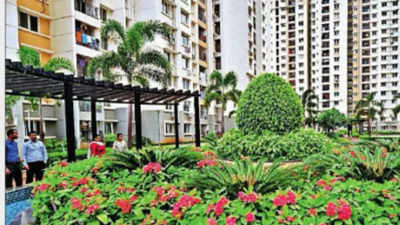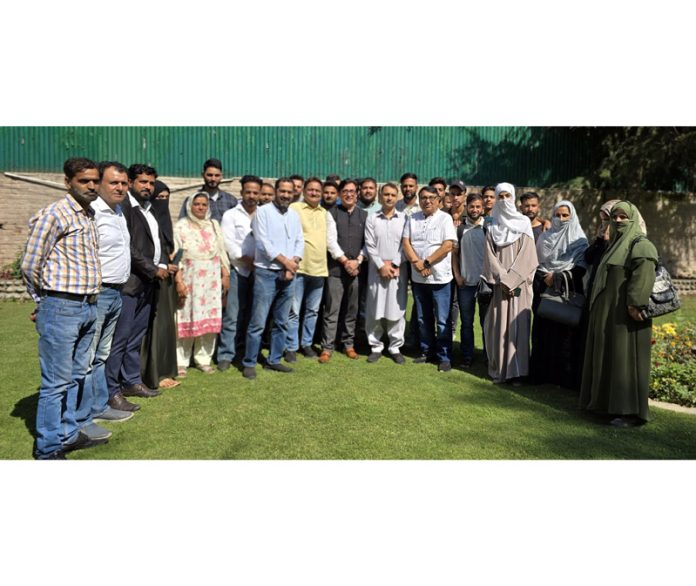Natasha Golf View (NGV) is a 350-unit apartment complex in Domlur. It generates 150 kg of wet waste daily. Fifteen years ago, NGV began composting in a small way.
Last year, they visited Swachagraha Kalika Kendra (SGKK) through the Solid Waste Management Roundtable (SWMRT), an NGO, and decided to use three DIY mesh composters, each costing around Rs 10,000. “Now, our wet waste is converted into 500 kg of compost every 45 days, and we use it as manure in our garden,” says Bidyut Nath, a resident who handles NGV’s housekeeping and waste management portfolio. Like Bidyut, Odette Katrak, a resident of Purva Paradise in Domlur, is also a proud composting champion.

The kind of person who never sends out any wet waste, not even a banana skin! “Vegetable peels are composted at home and fruit peels made into organic bioenzyme cleaners. No wet waste has been sent out of my home in the last eight years,” she says, adding “Compost is my favourite gift to friends. The smell of fresh mountain earth in your own home is just magical.
” Two years ago, Odette unleashed a green revolution in her apartment complex. “Now, no wet waste goes out from our building,” she says. Composting crucial TOI reported this week that some apartments are grappling with excess compost.
But Anu Govind of SWMRT says excess compost is less of a concern. Sending out mixed waste or not composting, she says, is a huge problem for the environment. “Many apartments have proven that composting is doable.
A 900-unit apartment complex typically sends around 650 kg of wet waste a day to the landfill, polluting the environment with methane emissions, and necessitating huge transportation costs and associated environmental issues. Where there is excess compost, she says, BBMP and the horticulture department should step in and help collect and use it for public parks and government campuses. Govt mandates that apartments and office complexes generating over 100 kilos of waste or covering an area of over 5,000 sq meters are considered bulk generators and must process their waste within their premises.
The infrastructure for this is to be provided by the builder, while the management committee has to oversee the operation. “A lot of apartments and office complexes in the city effectively manage their waste,” says Sandya Narayanan, trustee at SWMRT. Dealing with dry waste Odette of Purva Paradise has also effectively dealt with dry waste.
A year ago she noticed the huge increase in dry waste, especially paper bags from online deliveries. “These bags are now collected and passed daily to street vendors. Good bags get reused, helping to reduce plastic consumption.
Reuse, reuse, reuse those paper bags till they are torn completely. Only then put them for recycling,” she says. The project launched by Purva Paradise served as a pilot for the ‘Reuse Paper Bag’ campaign, one among many sustainable initiatives that Odette drives through Beautiful Bharat (earlier Beautiful Bengaluru) started in 2015.
Plastic bags are today being replaced by paper bags, which though biodegradable generate higher waste. Cartons that are not flattened occupy excessivespace. This includes regular food packaging like cornflakes cartons, and sweet boxes.
It is a good practice to collapse these before adding to dry waste, because this takes less volume in bins and fewer trips to transport waste, thus lowering the carbon footprint. At Phoenix One Bangalore West in Rajajinagar, N Ramakrishnan is the primary driver of its sustainability practices . The 472-unit apartment complex collects segregated e-waste once a month and sends it to recycler Saahas Zero Waste.
“The association provides welcome kits to new residents and organises periodical demos on waste segregation and management. Dry waste like carton boxes are stored in the basement and later sold to waste collectors,” says Ramakrishnan, a retired computer professional who helped computerise Indian Railways, BBMP and BDA. Mantri Espana also has a comprehensivesustainability programme.
Its vendor, Hasiru Dala, picks up waste only if it is properly segregated. The ₹Green Espana’ team has a robust resident awareness programme. “We do awareness on reducing rejects, by promoting menstrual cups and cloth pads.
We have also distributed the same to all women housekeeping staff,” says Seema, a Green Espana team member. Net zero campuses Ecoworld, a business park in Bellandur, says it has achieved net zero waste – no waste goes to landfills. It gets recycled or reused within the property.
“We also have certified recyclers to recycle paper, plastic, glasses, bottles, metal cans and tins,” says Shantanu Chakraborty, chief operating officer for India at Brookfield Properties, which owns the complex. Embassy Manyata Business Park, the larg-est business park in the city, says 100% of its food waste gets composted and nothing goes to landfills. The park displays a daily bulletin of how much waste was generated the previous day and compares it to how many people it could feed.
They also send monthly mailers on the previous month’s disposal. Saarang Ganapathi, COO at Embassy Services Pvt Ltd, says the awareness this created led to a 50% reduction in waste, especially food waste. Totally eliminating food waste is impossible, as there will be scraps, bones, gravy, etc, that can’t always be eaten.
“So we recommend our staff pack bones to feed strays, which further reduces the waste,” Saarang says. What’s left gets converted to compost, which is then used for horticulture and gardening. (Apartment complexes featured in this story are those that Solid Waste Management Roundtable rates as having the best sustainability practices).



















